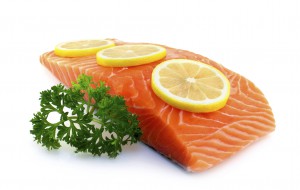I love fish. When I was a kid, I preferred the Filet-O-Fish to anything offered in the Happy Meal. These days, my tastes have matured. I’m always on the lookout for healthy, sustainable fish options, but choosing fish is often confusing. Which fish is safest? Should I eat farmed or wild?
 There are so many questions, and with the American Heart Association recommendation that we get at least two servings of fish per week, I thought I should get some answers.
There are so many questions, and with the American Heart Association recommendation that we get at least two servings of fish per week, I thought I should get some answers.
Fish Safety
If you’re concerned about fish safety and sustainability, it’s best to do your research before you buy so you’re prepared when you shop, says UVA registered dietitian Katherine Basbaum.
The Monterey Bay Aquarium Seafood Watch website allows you to select the best seafood where you live and print out a pocket guide to take with you. The aquarium also has a handy smartphone app that I’ve used for several years. This all takes some effort, but it’s worth it if fish safety is something that’s important to you.
When shopping for fish at the grocery store, Basbaum recommends using the aquarium’s safe seafood pocket guide in addition to talking to the fishmonger. “When you go to the store, you can’t take for granted that everything in the case is a good, safe choice. Fishmongers are employees and they’re hired to sell the fish. Not to say that the stores are selling unsafe fish, but in addition to their advice, do a little research of your own, too.”
Omega-3 Fatty Acids
Looking for a heart-healthy fish? Research shows that Omega-3 fatty acids found in cold-water, fatty fish can help lower your cholesterol. These healthy fish include:
- Salmon
- Tuna
- Herring
- Trout
- Mackerel
Farmed Versus Wild Fish
Basbaum says you can get Omega-3s from either wild or farmed fish, although those Omega-3s come from different sources:
- Wild fish: Bursting with potent Omega-3s from eating other fish, algae and plankton.
- Farmed fish: Offer satisfactory but lower quality Omega-3s due to their fish pellet diet
Also, Basbaum says according to the U.S. Department of Agriculture, farmed-raised salmon contains an average of 35 percent less Omega-3 fatty acids than wild salmon. But it can also come down to what you can afford. “If you’re on a budget, the healthy lean protein you get with farmed fish is a smart option. Wild fish can be extremely expensive,” Basbaum says.
What About Mercury?
Mercury is an issue with fish. The Environmental Protection Agency and Food and Drug Administration recommend young children and women who might become pregnant, women who are pregnant and breastfeeding mothers avoid the following fish, which contain high levels of mercury:
- Shark
- Swordfish
- King mackerel
- Tilefish
Watch a Fish Video
We toured the fish department of a local grocery store to find out the nutritional benefits of fish. Watch and find out what we learned!